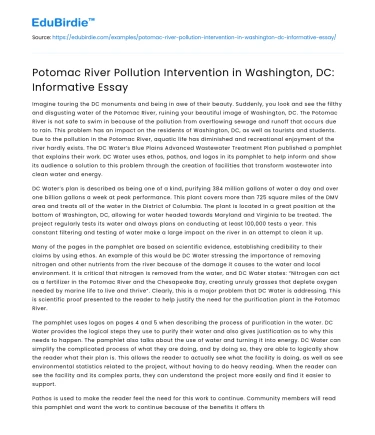Imagine touring the DC monuments and being in awe of their beauty. Suddenly, you look and see the filthy and disgusting water of the Potomac River, ruining your beautiful image of Washington, DC. The Potomac River is not safe to swim in because of the pollution from overflowing sewage and runoff that occurs due to rain. This problem has an impact on the residents of Washington, DC, as well as tourists and students. Due to the pollution in the Potomac River, aquatic life has diminished and recreational enjoyment of the river hardly exists. The DC Water’s Blue Plains Advanced Wastewater Treatment Plan published a pamphlet that explains their work. DC Water uses ethos, pathos, and logos in its pamphlet to help inform and show its audience a solution to this problem through the creation of facilities that transform wastewater into clean water and energy.
DC Water’s plan is described as being one of a kind, purifying 384 million gallons of water a day and over one billion gallons a week at peak performance. This plant covers more than 725 square miles of the DMV area and treats all of the water in the District of Columbia. The plant is located in a great position at the bottom of Washington, DC, allowing for water headed towards Maryland and Virginia to be treated. The project regularly tests its water and always plans on conducting at least 100,000 tests a year. This constant filtering and testing of water make a large impact on the river in an attempt to clean it up.
Save your time!
We can take care of your essay
- Proper editing and formatting
- Free revision, title page, and bibliography
- Flexible prices and money-back guarantee
Many of the pages in the pamphlet are based on scientific evidence, establishing credibility to their claims by using ethos. An example of this would be DC Water stressing the importance of removing nitrogen and other nutrients from the river because of the damage it causes to the water and local environment. It is critical that nitrogen is removed from the water, and DC Water states: “Nitrogen can act as a fertilizer in the Potomac River and the Chesapeake Bay, creating unruly grasses that deplete oxygen needed by marine life to live and thrive”. Clearly, this is a major problem that DC Water is addressing. This is scientific proof presented to the reader to help justify the need for the purification plant in the Potomac River.
The pamphlet uses logos on pages 4 and 5 when describing the process of purification in the water. DC Water provides the logical steps they use to purify their water and also gives justification as to why this needs to happen. The pamphlet also talks about the use of water and turning it into energy. DC Water can simplify the complicated process of what they are doing, and by doing so, they are able to logically show the reader what their plan is. This allows the reader to actually see what the facility is doing, as well as see environmental statistics related to the project, without having to do heavy reading. When the reader can see the facility and its complex parts, they can understand the project more easily and find it easier to support.
Pathos is used to make the reader feel the need for this work to continue. Community members will read this pamphlet and want the work to continue because of the benefits it offers the community. This water that is being purified also affects their health. DC Water explains: “Before sewers, disposal methods were even more primitive, contributing to epidemics of cholera and dysentery that caused a high death rate. Sewage conveyance and treatment, and the sanitation they brought to the district, were heralded for public health, quality of life, and economic benefits.” It is an understatement to say this treatment plant is important. This sewage water could be the reader’s drinking water, therefore growing an emotional connection to this project. Without DC Water, the reader might not be getting clean drinking water, which raises major health concerns. Therefore, the reader may feel obligated to support DC Water and their efforts.
The pamphlet’s target audience is local citizens, politicians, and financial backers. Citizens are concerned with their community and are always looking for ways to improve it. In this instance, citizens in the DMV area are concerned with the pollution and poor quality of water in the Potomac River. This pamphlet targets politicians in the hope of gaining support and making sure they are able to continue what they are doing in their community. If there was a problem with their project, there could be actions taken to prevent DC Water from doing what they are doing. Politicians can also provide government funding to their agency if they believe it is doing a good job. Through the pamphlet, DC Water can garner support and help grow its project through its different methods of appeal.
This pamphlet provides a great way to inform the community about a local solution to a serious problem. There is scientific and factual evidence, as well as a local emotional appeal to those who read it. The author is able to explain the importance of this project, and this project does a great job of trying to solve the problem of pollution in the Potomac River. This project showed me how powerful the use of pathos, logos, and ethos is. Through the use of those techniques, DC Water showed why their work is important, and how their project is making a great impact in the DMV area. It is important to call on the community and local legislators of Washington, DC to support DC Water and take the appropriate steps necessary to help end pollution in the Potomac River.






 Stuck on your essay?
Stuck on your essay?

